A Fork in the Road – Lowell or Nittany Valley?
Autumn, 1961 – A Few Personal Notes
My intent to go ahead with graduate work, perhaps at MIT or Cornell, touched upon many side issues in my life. The year 1961 still rocked with America’s fear and concerns over Sputnik, the Cold War crisis boiling over again in Berlin and the spread of worldwide Communism in Cuba plus Vietnam.
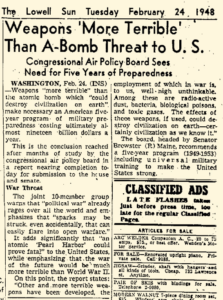
Might I be called to serve in the military, or would I be given a student deferment because of my upcoming graduate studies in science? Much lay in the balance.
My color blindness, discovered by an ROTC medical technician during my sophomore year at the Lowell Technological Institute, LTI, (now, UMass-Lowell) had disqualified me from a potential career as a jet fighter pilot in the Air Force. However, since my own interests were clearly focused on an R&D position – analogous but more rigorous than the positions that I have already held during previous summers at the Air Force Cambridge Research Labs in Bedford, Massachusetts – my official classification as being ineligible as a fighter pilot candidate did not set me back. At the time, however, I felt even more confident about the wisdom shown by the Air Force. However, the future seemed unclear.
But, where might I fit into the bigger picture? Fortunately, my exposure to the ROTC program at LTI only helped to confirm my belief that the security of the nation might best be ensured, specifically, through my deep interest in physics, chemistry and mathematics.
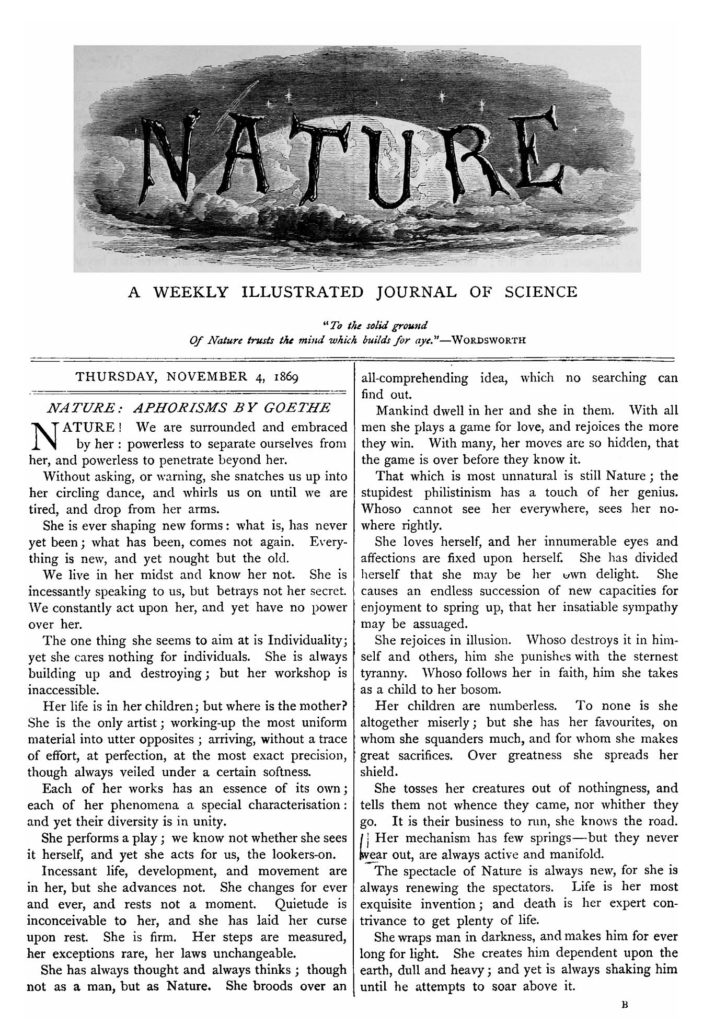
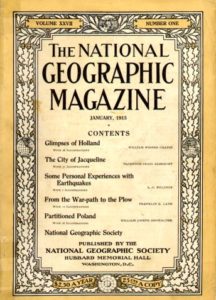
Maybe, I could make a contribution in a national laboratory? Such dreams allowed me to fantasize a wonderful career away from the tug of Lowell.
Of course, as a newly minted, young graduate from a yet-to-be-recognized technical program, my national ranking as the proud holder of a Bachelor of Science degree appeaed rather modest, and truly unimpressive, in the critical eyes of the admissions officers at MIT, Cornell and elsewhere.
It remained encouraging to note that my grades as a junior and a senior had gradually improved over those in the previous, two years. As a junior in the Department of Physics, I managed a respectable GPA of 3.4 on a perfect 4.0 rating, but in my senior year, that GPA went straight up to the vaunted 4.0 that most college students dream of attaining.
For the first time in my life, I felt that I had, indeed, achieved something of value and importance, which became an imaginary badge of merit to pin onto the rather shabby garments of a scruffy kid from that poor, Franco-American neighborhood where personal aspirations were, usually, tainted, by scores of parochial and ethnic limitations, plus bruising, economic failures.
Still, my greatest fear remained a horror show, of sorts. In this nightmare, I awaken to find myself strangled in a cotton mills job. Also, tied to me there might be a pregnant housewife, and two young ones in fresh diapers, to nurture and protect. If hell existed as a physical place, this would be its address. It was clear to me that a person needed to bring special skills to the marketplace so as to avoid the the debilitating pitfall of being the sad and lost wage-earner in the local textile environment whose days were severely limited. My grand-father, Eugene Bolduc, who had been elected President of the Centralville Social Club (see insert below) enjoyed, I hope, this honor, but his was never a life of financial success and ease. After being a postal worker in the city for 30 years, he had died in 1937 with nothing but debts to show for his efforts. Sometimes, life seems a bit cruel.
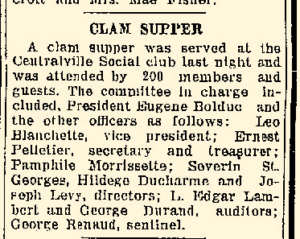
Then i in September of 1961, my dad had been dead for eight and one-half- years. Thoughts of colorful autumn leaves and new surroundings in central Pennsylvania assume a nurturing allure of peace and solace.. Mom and the rest of the family, Bob, Michelle and Denise, were safe at home. They maintained their calm, at least, for the moment. Somehow, they would manage. My mental equilibrium depended, to a great extent, on their personal courage and faith in me, also.
Aunt Lida, Aunt Florence plus Uncle Gerry, Uncle George and Uncle Albert represented the extended, family tree of common history, all shared my concerns and warm moments of laughter, religious celebrations and sips of brandy, an occasional beer toast plus a Sunday pot roast and Mom’s tapioca pudding. But, not ever having experienced a true separation from this familial ambiance, uncertainty and, a little bit of anxiety entered my being.
How would I react in a world not totally permeated with a peculiar, 16th century, working-class, French-Canadian, Catholic set of opinions and ideas?
Could there comfortably be a comfortable place in the larger world, for a hesitant, curious and willing young person with many illusions, uncertain hopes, dreams and aspirations?
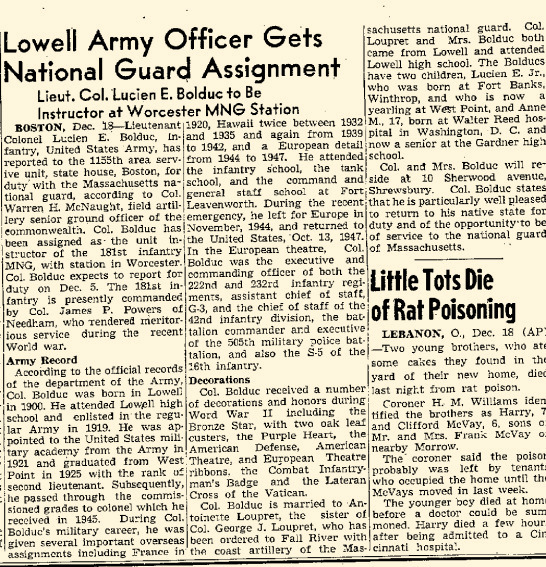
These represented serious issues for which I had no easy answers. Except for Uncle Lucien, Colonel Lucien E. Bolduc of the U.S. Army, Rainbow Division, no one in my immediate family had ever dared to venture far from these familiar neighborhoods.
The insert above describes some of the success attained by my Franco-American uncle, whose example was proof-positive to me that a struggling Canuck kid from Centralville, Lowell, Massachusetts could actually achieve some notable stature in the US of A.
Along this line of thinking, perhaps, the Physics Department of the Pennsylvania State University, PSU, appeared to be the answer to my query as to how to proceed, next. Uncle Lucien was on the professional staff at PSU, so that he could provide me with important insights on how best to establish myself in the graduate world of physics research.
XXXXXXXXXXXXXXXXX
This seemed like a chance for me tomy favorite success story establish some new ground rules. Certainly, Lewis and Clark must have sensed similar uncertainties when they first ventured off through the vast, uncharted territories to the west of St. Louis, Missouri, in the early 1800s. My own trials would surely be challenging, but in comparison to these national heroes, there appeared to be no authentic reason for my curious questions and hesitations.
LTI, with its many students coming from nearby Massachusetts and New Hampshire townships, had already offered me an opportunity better to see and accept the outside world, through the broader lenses of non-local eyeballs. The day-to-day reactions of fellow students expressed at convocations, and in the various classrooms, clearly were not simply carbon copies of viewpoints commonly held in The Acre, Little Canada or in Lower Centralville. It seemed to me that other people held onto strange beliefs and convictions. I, then, challenged myself to become more open to a broader Weltanschauung (world view) as our German friends might say.
Students coming from New York City and others from Brazil and India were even more unique and unusual to my naive, parochial eyes. Clearly, peoples from the entire planet don’t all see the world with the same set of values, behaviors and aspirations. Yet, it was quite exciting to enjoy these cultural differences, that shake and mold our individual personalities. Everyone seemed to be a unique product, an amalgam of his or her combined, early influences.
Such a curious world, that we are asked to inhabit!
[more later]
